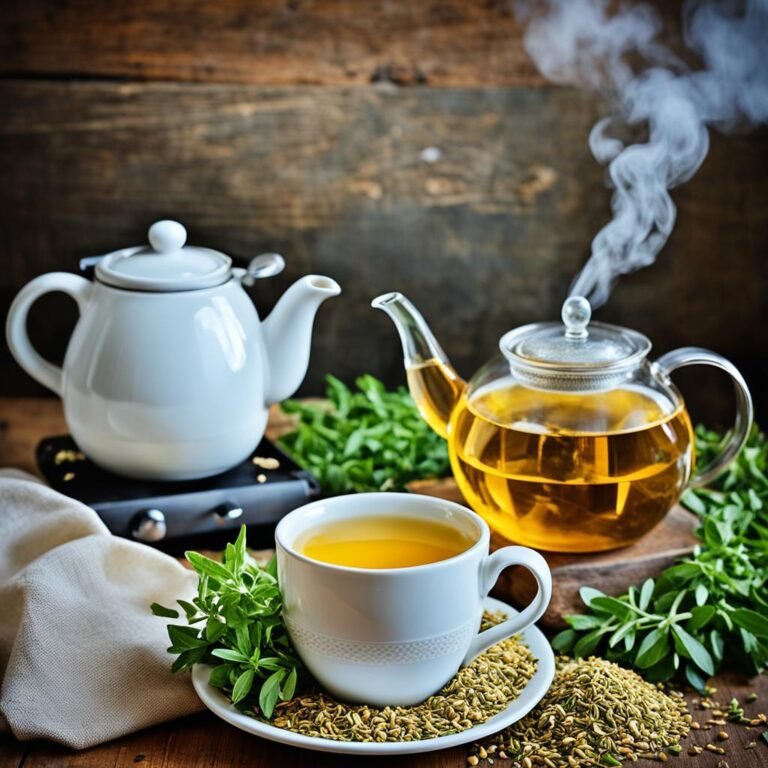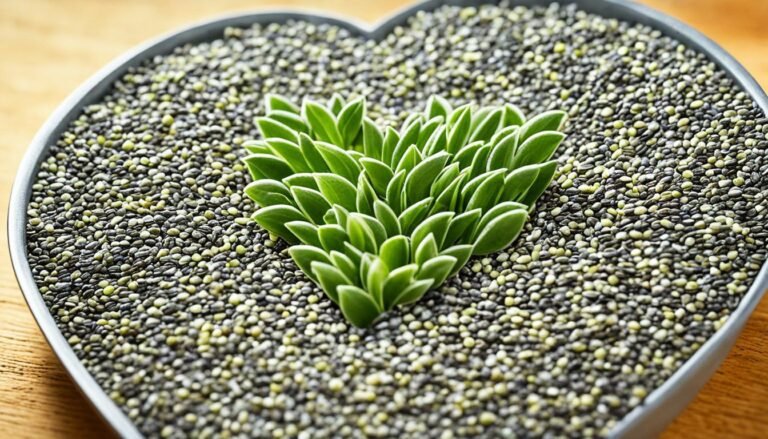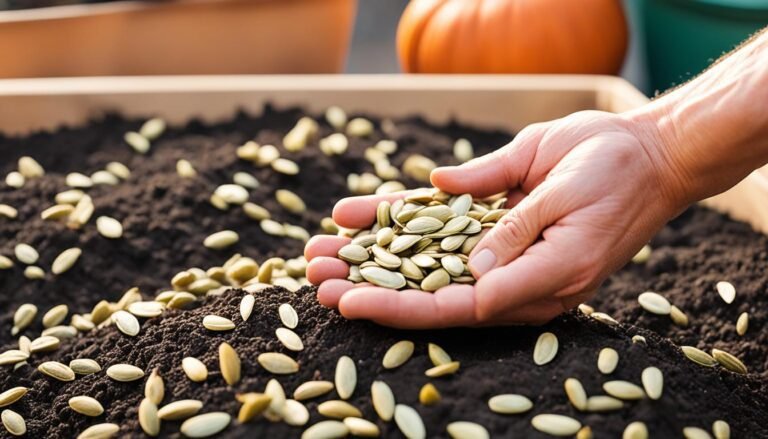Cooking with Poppy Seeds: Tasty Tips & Tricks
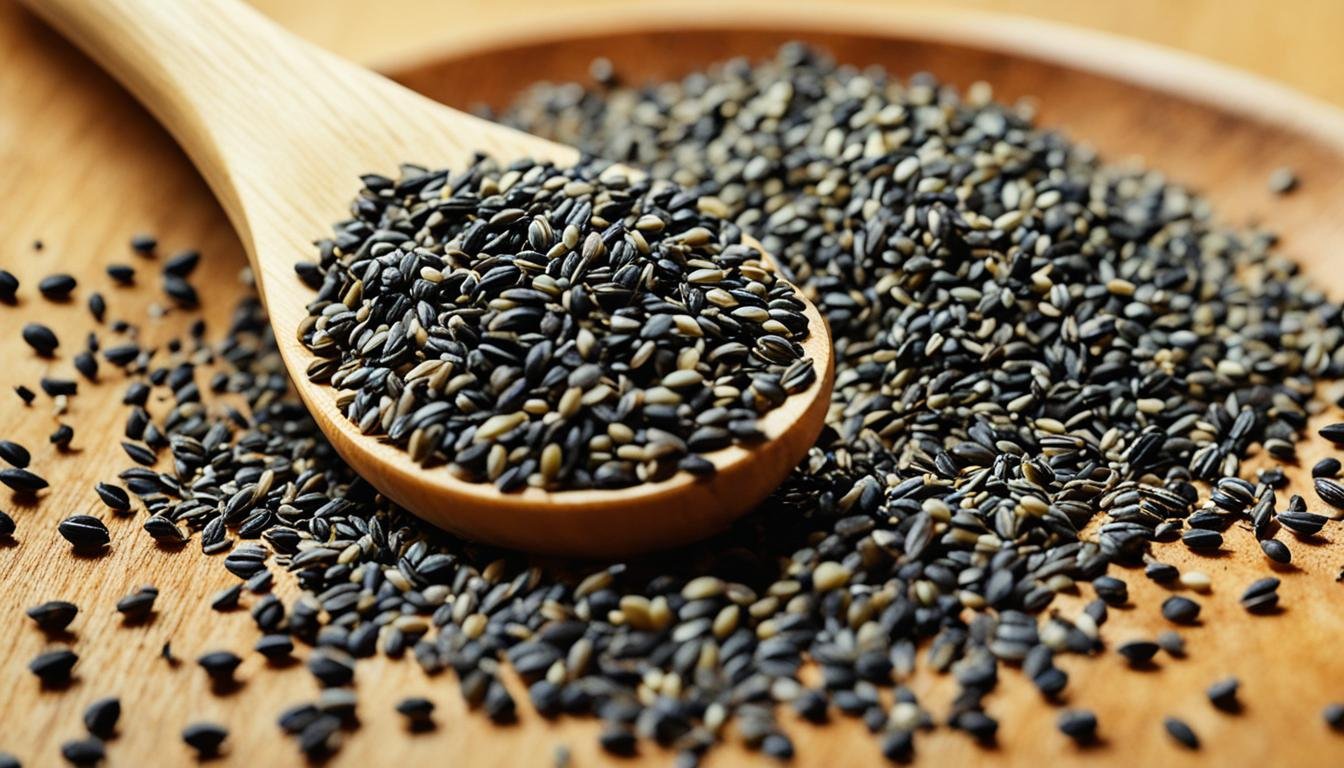
Did you know there are 1 to 2 million poppy seeds in just one pound? These tiny seeds have been a key ingredient since ancient times. Today, the blue poppy seed is the top choice for cooking. Poppy seeds add a nutty taste and are packed with nutrients. Let’s look at how you can use them in your cooking and baking.
Poppy seeds are great for both experts and beginners. They’ve become popular in Eastern European cuisine and are good for your health. Join us as we share tips and tricks for cooking with these amazing seeds!
The Nutty, Versatile Poppy Seed
Poppy seeds have a long history, becoming a key food ingredient around the first century CE in the Mediterranean. The poppy flower, from which these seeds come, dates back to 2700 BC for medicinal use. When Alexander the Great’s armies reached Egypt, they brought spices from the Middle East, including poppy seeds.
What Are Poppy Seeds?
Poppy seeds are tiny, kidney-shaped seeds from the opium poppy plant, Papaver somniferum. They come in blue, black, and white, but blue is the most common. These seeds have a nutty flavor that gets stronger when roasted or toasted.
Poppy Seed Flavor Profiles
The taste of poppy seeds changes with their origin and how they’re prepared. Blue poppy seeds in the U.S. have a mild, nutty taste. White poppy seeds from the Middle East are sweeter and more delicate. Black poppy seeds have a strong, earthy flavor.
| Poppy Seed Variety | Flavor Profile | Typical Usage |
|---|---|---|
| Blue Poppy Seeds | Mild, nutty | Widely used in the U.S. |
| White Poppy Seeds | Slightly sweet, delicate | Common in Middle Eastern cuisine |
| Black Poppy Seeds | Robust, earthy | Less common in Western cooking |
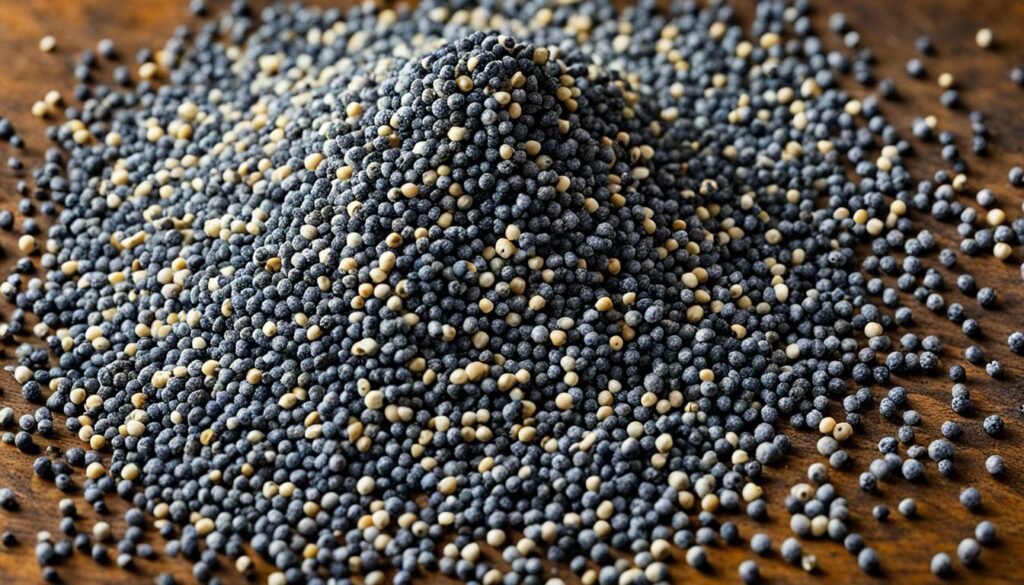
“Poppy seeds have a subtle nutty flavor and light sweetness that intensifies when roasted or toasted.”
Poppy seeds are versatile and can be used in many dishes, from breads to salads. Their unique taste and health benefits make them a favorite worldwide.
Buying and Storing Poppy Seeds
When buying poppy seeds, it’s smart to avoid bulk purchases. Most people in the U.S. don’t use them often. So, it’s better to get smaller bottles from the baking and spice aisles. These bottles are sealed and dated, ensuring you get the freshest poppy seeds.
After buying poppy seeds, keep them in a dry, cool, dark spot. Use an airtight container in your kitchen. This keeps their nutty, slightly sweet taste and stops them from going bad. Stored right, poppy seeds can last up to 1 year or more.
Remember, don’t eat poppy seeds meant for gardens. These seeds might not be safe for eating. They’re not kept as clean as those for cooking.
- Purchase poppy seeds from a vendor that sells them in high volume to ensure freshness.
- Store poppy seeds in an airtight container in a cool, dry place for up to 1 year.
- Avoid eating poppy seeds labeled for gardening, as they may not be kept in safe conditions.
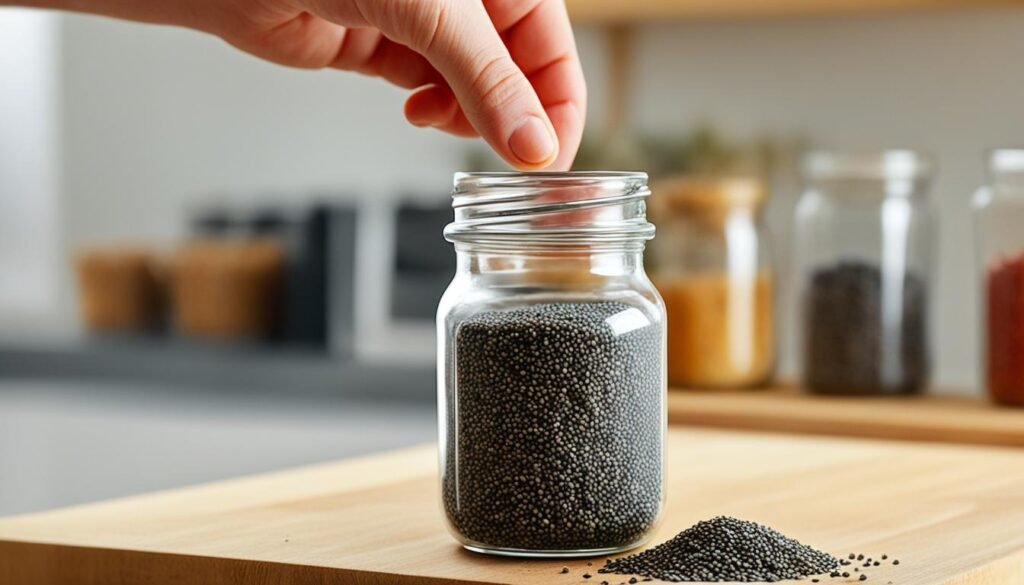
Follow these easy tips to enjoy the great taste and versatility of poppy seeds in your cooking and baking for months.
Health Benefits of Poppy Seeds
Poppy Seed Nutrition
Poppy seeds are tiny but mighty, full of nutrients. They are a great source of fiber, omega-6 fatty acids, and many minerals. Just one tablespoon gives you about 2 grams of protein, which is a lot for such a small amount.
These seeds are full of healthy fats. They contain linoleic acid, oleic acid, and other beneficial acids. These fats can help lower the risk of heart disease by reducing bad cholesterol and improving blood flow.
| Nutrient | Amount per Tablespoon (9g) | % Daily Value |
|---|---|---|
| Calories | 46 | – |
| Protein | 1.6g | – |
| Fat | 3.7g | – |
| Carbohydrates | 2.5g | – |
| Fiber | 1.7g | 6% |
| Manganese | 0.5mg | 26% |
| Copper | 0.3mg | 16% |
| Calcium | 101mg | 10% |
| Magnesium | 27mg | 7% |
| Phosphorus | 57mg | 6% |
| Zinc | 0.6mg | 6% |
| Thiamin | 0.1mg | 6% |
| Iron | 0.7mg | 5% |
Poppy seeds are also good for your health in many ways. They can boost fertility and improve sexual health. They help with digestion, treat constipation, and support bone health.
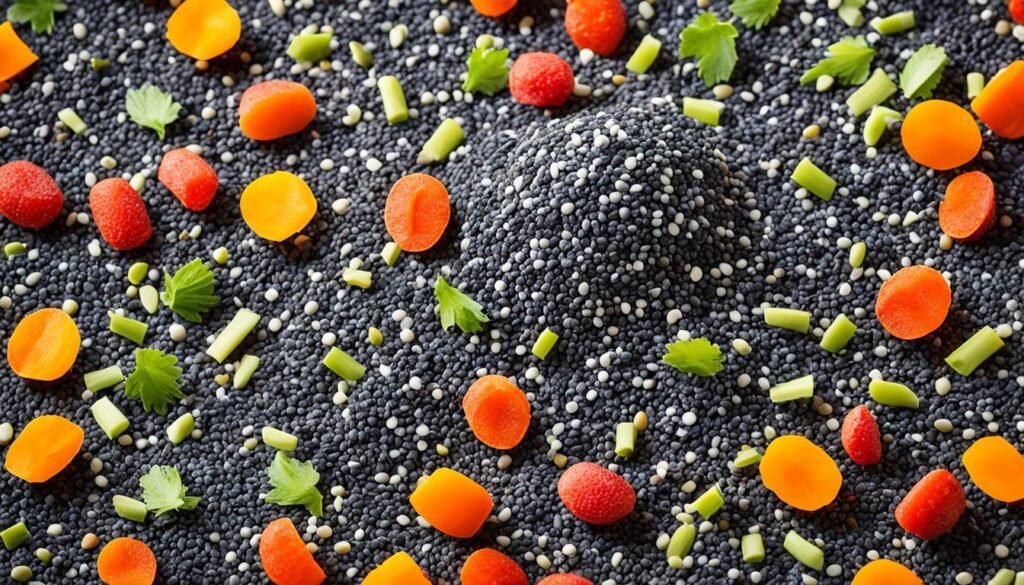
But, it’s important to know that poppy seeds have morphine and other drugs in them. Eating them without washing or using them as natural remedies can be dangerous. They should be eaten in small amounts and from trusted sources.
Baking with Poppy Seeds
Poppy seeds are a true star in baking. These tiny seeds add a nutty flavor to breads, pastries, muffins, and cakes. Sprinkle them on top or mix them into the batter for a delightful crunch and flavor boost.
Poppy Seed Bread and Pastries
In Eastern European baking, poppy seeds are key. They’re found in Polish strudels, Hungarian bread puddings, and holiday breads. But they’re not just for traditional recipes. They also shine in American favorites like lemon poppy seed loaves and savory onion-poppy seed breads.
Did you know 1 in 27 recipes is for homemade bread? And poppy seed bread is a Christmas Eve tradition in some families. These seeds open up endless baking possibilities.
Poppy Seed Baking Tips
- Use as little as 1 tablespoon of poppy seeds for a visual touch, or 3 to 4 tablespoons for a stronger flavor.
- Grind the poppy seeds in a coffee grinder for the best results.
- Temper egg yolks when making poppy seed fillings or custards to avoid scrambling.
- Try mixing poppy seeds with lemon, zucchini, or grapefruit for unique flavors.
Poppy seeds are great for making lemon poppy seed muffins or traditional pastries. They add a versatile and flavorful touch to your baking.
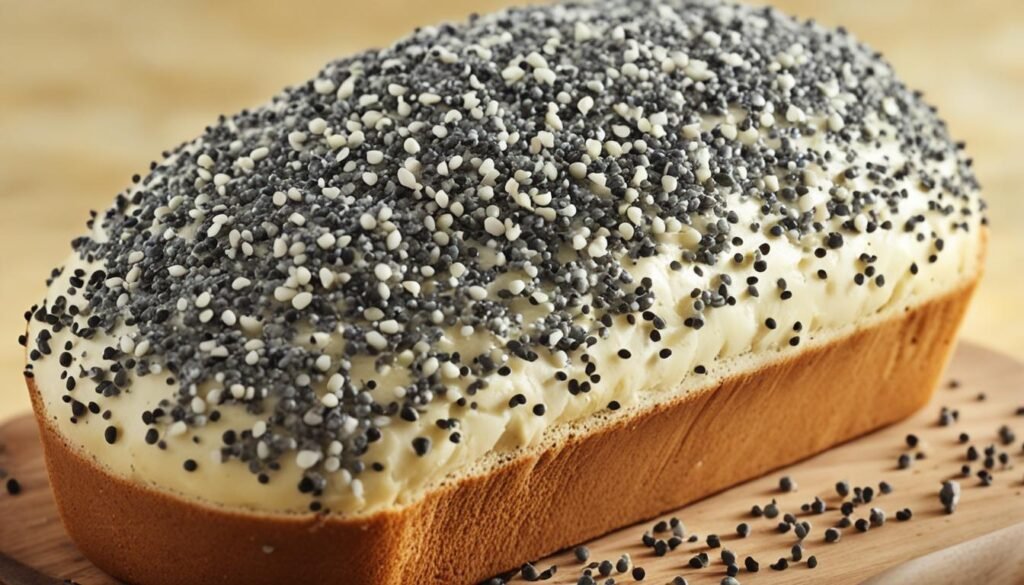
Cooking with Poppy Seeds
Savory Poppy Seed Recipes
Poppy seeds are not just for sweet treats. They bring a delightful crunch and nutty taste to savory dishes. Use them in everything from crusted proteins to salads and dressings. They’re a versatile ingredient for your savory cooking.
Poppy seeds are a key part of the trendy everything bagel seasoning. This mix includes poppy seeds, sesame seeds, garlic, and onion powder. It adds a great crunch and flavor to bagels, crackers, roasted veggies, and avocado toast.
Poppy seeds also add a nice texture and nutty flavor to breaded or crusted proteins. Mix them into your breadcrumb or panko coating for extra flavor and crunch. Try it on chicken, pork, or fish.
- Poppy seed-crusted salmon or halibut
- Poppy seed-breaded chicken tenders
- Poppy seed-crusted pork chops
Poppy seeds are great in salad dressings and sauces too. They add texture and help thicken and emulsify the dressings. Make a creamy poppy seed dressing or add them to pasta salad or coleslaw for crunch.
| Savory Poppy Seed Recipe | Main Ingredient(s) | Preparation Time | Skill Level |
|---|---|---|---|
| Everything Bagel Crackers | Flour, nuts, seeds | 30 minutes | Easy |
| Poppy Seed Crusted Chicken | Chicken, poppy seeds, breadcrumbs | 45 minutes | Moderate |
| Creamy Poppy Seed Dressing | Poppy seeds, mayonnaise, vinegar | 10 minutes | Easy |
Looking to add crunch to your dishes or try new flavors? Don’t skip over poppy seeds. They have a nutty, slightly sweet taste that can improve many savory recipes.
Sweet Poppy Seed Delights
Poppy seeds make baked goods special, from cakes and cookies to muffins and pancakes. They add a subtle nutty flavor or can be the star of the show. Poppy seeds take your treats to new heights.
A Vegan Poppy Seed Coffee Cake is a great example. It uses common ingredients for a moist, tasty crumb. The coffee adds a rich, aromatic touch to this vegan treat.
For a classic poppy seed delight, try a Poppy Seed Roll. This vegan recipe has a soft dough filled with sweet poppy seeds. It’s perfect for slicing and serving at gatherings.
Don’t miss out on the Vegan Lemon Poppy Seed Cookies. These cookies are bright, tangy, and full of poppy seeds. They’re likely to become a favorite in your household.
“Poppy seeds add a delightful crunch and nutty flavor that elevates any baked good from ordinary to extraordinary.”
Craving coffee cake, a roll, or cookies? These poppy seed desserts and poppy seed treats will hit the spot. They’re perfect for adding a unique twist to your baking.
The History and Origins of Poppy Seeds
Poppy seeds have a long history that goes back thousands of years. They first became a food ingredient in the first century CE in the Mediterranean Basin. Poppy flowers, their source, were used for medicine as far back as 2700 BC.
Alexander the Great’s empire brought poppy seeds to Greece from the Middle East. This is how they started being used in baked goods and sweets in the region.
Today, poppy seeds are a key part of many cuisines, especially in Eastern Europe. In 2018, the world produced 76,240 tonnes of them. Turkey led with 35%, followed by the Czech Republic and Spain.
| Top 5 Poppy Seed Producing Countries (2018) | Production (Tonnes) |
|---|---|
| Turkey | 26,991 |
| Czech Republic | 13,666 |
| Spain | 12,360 |
| France | 4,514 |
| Hungary | 3,800 |
Poppy seeds are not just tasty but also packed with nutrients. They have 28% carbs, 42% fat, and 21% protein, offering 525 calories per 100 grams. Their unique flavor comes from 2-pentylfuran, which tastes nutty.
Poppy seeds are great for baking, salads, or just enjoying their history. They continue to amaze and please food lovers everywhere.
Poppy Seeds in Different Cultures
Eastern European Poppy Seed Traditions
Poppy seeds are a big part of Eastern European food, with a long history and deep cultural meaning. They are used in many traditional dishes, desserts, and celebrations across the region.
My father-in-law, Zvi Guttman, survived the Holocaust and moved from Hungary to Israel. He brought with him the poppy seed traditions of his homeland. His mother made a simple dish with noodles, sugar, oil, and lots of poppy seeds. This dish showed how important poppy seeds are in Eastern European food.
The Jewish pastry, hamantaschen, also shows how much people love poppy seeds. These pastries look like Haman’s ears from the Old Testament. In Israel, poppy seed filling is the top choice for these pastries. This shows the strong link between poppy seeds and the region.
In Central and Eastern Europe, people have grown poppy seeds for thousands of years. They use them in many dishes, like cakes, strudels, bialys, and pletzels. The Czech Republic is a big producer of poppy seeds, showing how important they are in the area’s food.
The story of poppy seeds is part of Eastern European culture. It shows how a simple ingredient can have a big impact. Whether it’s Zvi’s childhood noodle dish or the Jewish tradition of hamantaschen, poppy seeds are a key part of the region’s heritage.
Cooking with Poppy Seeds
Poppy seeds can make both sweet and savory dishes better. If you want to try cooking with poppy seeds and poppy seed recipes, there are many tasty options.
Enjoy poppy seeds in baked goods like Lemon Poppy Seed Muffins or a Vegan Poppy Seed Coffee Cake. They add a nutty, slightly sweet taste and a nice texture.
For something savory, try a Tahini Poppy Seed Dressing on salads or grain bowls. Poppy seeds bring a crunchy texture and look. Another savory dish is Hungarian-Style Cabbage Noodles, where poppy seeds add a special flavor.
Want to be creative? Make Seed Crackers with poppy seeds for a healthy snack. Or, try making Poppy Seed Milk for a dairy-free milk alternative.
“Poppy seeds are a fantastic way to add texture, flavor, and visual interest to both sweet and savory dishes. The possibilities are endless when it comes to cooking with these versatile little seeds.”
Don’t hesitate to try cooking with poppy seeds in your favorite recipes. From baked goods to dressings, these small seeds can make your dishes more exciting.
Poppy Seed Salads and Dressings
Poppy seeds are a great addition to salads, making them look and taste amazing. They add a nutty, earthy flavor that goes well with many greens and toppings. Whether you’re making a tangy dressing or a crunchy salad, poppy seeds are a must-have.
Creamy Poppy Seed Dressing
This Tahini Poppy Seed Dressing is a great choice for those avoiding dairy and eggs. It’s creamy thanks to ingredients like yogurt or mayonnaise, but it’s free from common allergens. With tangy rice wine vinegar, sweet honey, and nutty poppy seeds, it’s perfect for any salad.
To make this dressing, you’ll need:
- 1 1/2 tablespoons poppy seeds
- 3/4 cup rice wine vinegar
- 3/4 cup sugar
- 1 1/2 cup vegetable oil
- 3/4 teaspoon dry mustard
- 1 1/2 teaspoons salt
- 1 1/2 – 2 tablespoons diced red onion
Just mix all the ingredients together until they’re well combined. You’ll have a creamy dressing that makes any poppy seed salad taste amazing.
Building the perfect poppy seed salad is easy. Start with fresh greens like spinach and lettuce. Then, add toppings like crispy bacon, red onion, and Swiss cheese. Grilled chicken adds protein. Top it all off with the delicious Tahini Poppy Seed Dressing.
This salad keeps well, staying fresh for up to a week. The dressing can be stored in the fridge for 2 days. So, why not try poppy seeds in your next salad and see how they can elevate your meals?
Everything Bagel Seasoning with Poppy Seeds
Poppy seeds are key in making the popular everything bagel seasoning. This mix is a must-have in many kitchens, adding a savory, nutty flavor to many dishes. You can buy it or make it yourself, which lets you tailor it to your taste.
To make your own, you’ll need poppy seeds, sesame seeds, dried garlic, dried onion, and sea salt. Use 2 parts poppy seeds and sesame seeds, 1 part garlic and onion, and a bit of sea salt. This mix makes about 3/4 cup and keeps for 6 months in an airtight container.
To make your own everything bagel seasoning with poppy seeds, follow these steps:
- Combine 2 tablespoons of poppy seeds, 1 tablespoon of white sesame seeds, 1 tablespoon of black sesame seeds, 1 tablespoon plus 1 teaspoon of dried minced garlic, 1 tablespoon plus 1 teaspoon of dried minced onion, and 2 teaspoons of flaked sea salt or coarse salt in a small bowl.
- Mix the ingredients well until fully combined.
- Transfer the everything bagel seasoning to an airtight container and store it at room temperature for up to 6 months.
This homemade seasoning is great for adding flavor to many dishes, like bagels, bread, roasted veggies, and proteins. The mix of poppy seeds, sesame seeds, garlic, and onion makes a unique and tasty flavor that will make any meal better.
| Ingredient | Amount |
|---|---|
| Poppy Seeds | 2 tablespoons |
| White Sesame Seeds | 1 tablespoon |
| Black Sesame Seeds | 1 tablespoon |
| Dried Minced Garlic | 1 tablespoon + 1 teaspoon |
| Dried Minced Onion | 1 tablespoon + 1 teaspoon |
| Flaked Sea Salt or Coarse Salt | 2 teaspoons |
When making your own seasoning, you can tweak the flavors to your taste. Some like to add black pepper or paprika for extra zest. The type of salt you use can also change the flavor. Try different spices to find your ideal blend.
With this homemade seasoning, you can easily improve your cooking and baking. It adds a savory touch to many dishes. Enjoy making your own blend at home.
Conclusion
Poppy seeds are a great addition to your cooking and baking. They can make your dishes more flavorful and interesting. You can add them to baked goods, savory dishes, or even dressings and seasonings.
These little seeds are packed with nutrients like protein, fiber, and antioxidants. They are versatile, fitting into everything from breads and pastries to salads and dips. Poppy seeds are a great choice for anyone looking to improve their health.
Keep exploring the world of poppy seeds and have fun with them. They bring unique flavors to your cooking. With their versatility, nutritional benefits, and taste, poppy seeds are essential for any home cook.
FAQ
What are poppy seeds and what do they taste like?
Poppy seeds are small, dark seeds from the poppy flower. They have a subtle, nutty flavor with a light sweetness. This sweetness gets stronger when roasted or toasted.
How can I use poppy seeds in cooking and baking?
Poppy seeds are versatile and can be used in many ways. They’re great as a topping for breads, bagels, muffins, and cakes. You can also add them to batters and dough.
Poppy seeds are a staple in Eastern European cuisine, often used in pastry fillings and custards. They’re also great in savory dishes, salad dressings, and spice mixes like everything bagel seasoning.
How should I store poppy seeds to keep them fresh?
For freshness, buy poppy seeds in small bottles or containers. Store them in an airtight container in a cool, dry, dark spot in your kitchen. Avoid buying in bulk to keep their flavor and aroma.
What are the health benefits of poppy seeds?
Poppy seeds are packed with fiber, essential fatty acids, and various minerals like calcium, magnesium, and zinc. They’re also a good source of protein, making them a nutritious addition to your diet.
Can I grow my own poppy seeds?
Yes, you can grow poppy flowers from food-grade poppy seeds. But, it’s best not to eat poppy seeds meant for gardening. They might not be as clean as those from the baking or spice aisle.

